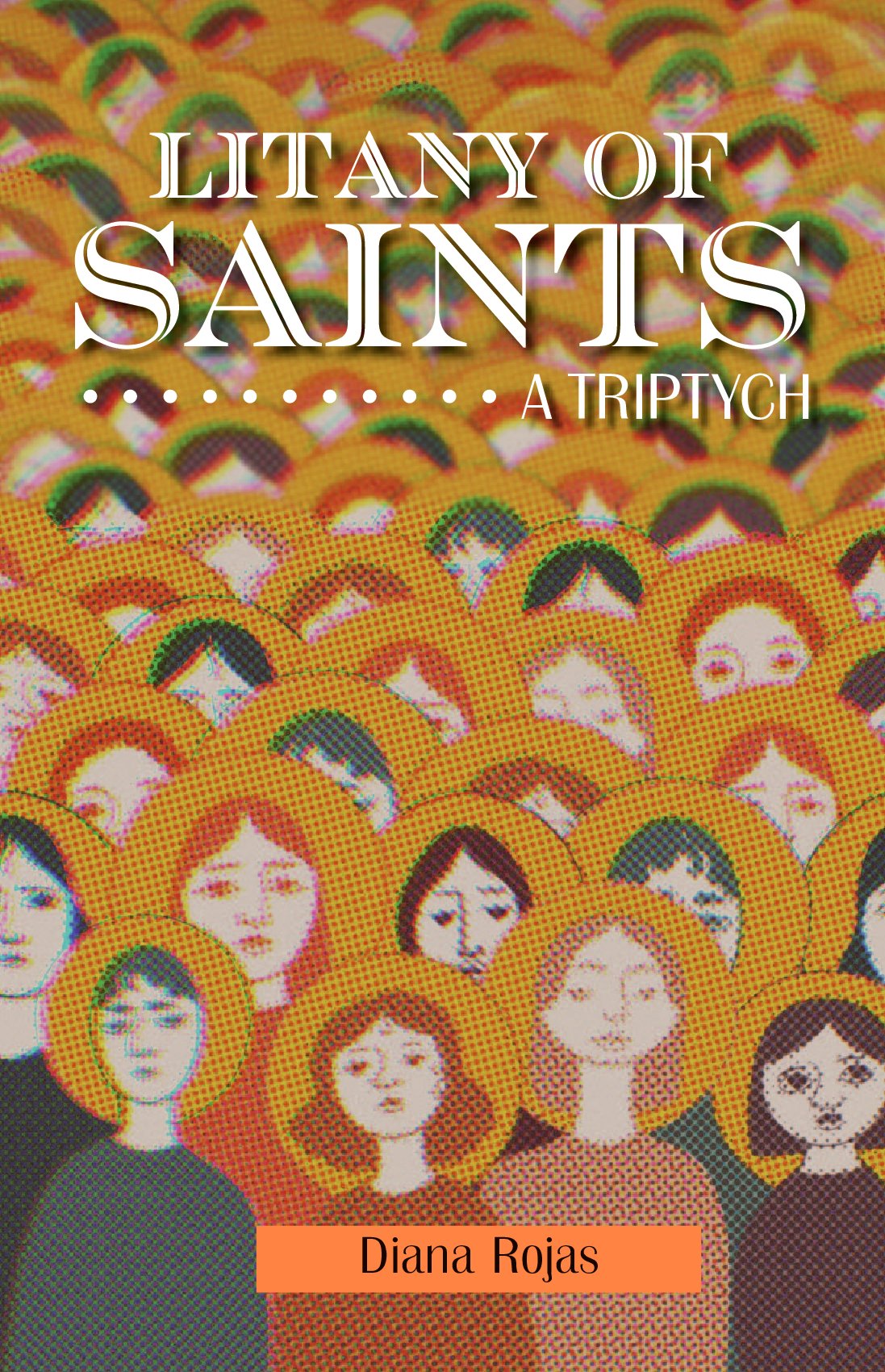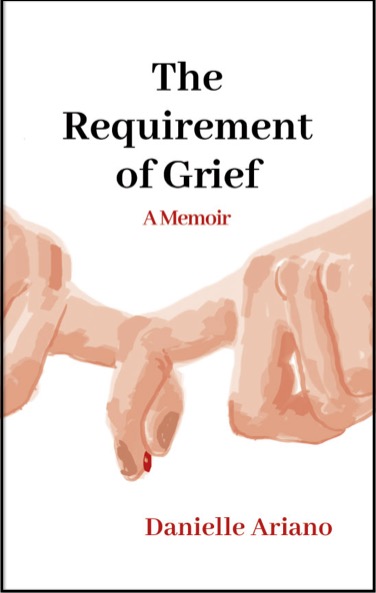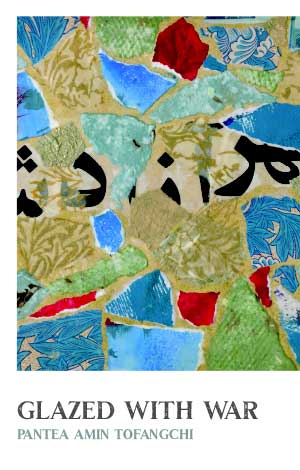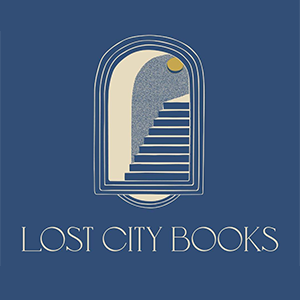Author’s Corner
We treat the recent works of local authors from independent publishers like national bestsellers by spotlighting them across all our programming and through community collaborations.
Our Spotlighted
July Author

Diana Rojas
Author of Litany of Saints
Diana Rojas has written in everything from large daily newspapers to niche newsletters, on subjects ranging from untimely deaths and school board meetings, to housing and sustainability issues. She grew up in Connecticut and New Jersey and has lived in five different countries. Diana has tried her hand at fundraising, real estate, gardening and child rearing, but despite her NYU journalism degree, she never expected to write a book. Litany of Saints is her first novel. She lives, taxed and unrepresented, in Washington, DC.
Is reinvention truly possible? Can a person expand beyond the confines of cultural expectations, or will they end up just reverting to type?
Litany of Saints, a triptych, tells the stories of immigrants from the same Costa Rican suburb who face challenges to their self-perception, forcing them to grapple with what they’re supposed to be and who they want to be.
In “The Lives of Saints,” Felipe and Ruth are chasing the American Dream, but are hamstrung by her inability to free herself from the traditional and religious customs of her family. “Las Tres Marías” follows three first-generation American sisters who return to live in their parents’ home country, but come disastrously face to face with an insidious machismo they are unprepared to handle. And in “La Familia,” John or Juan Manuel, a Costa Rican immigrant to the United States gets pulled back to the country of his birth amid the messy Cold War politics of the early 1980s, forcing him to question his loyalties and his ideas of what it means to be Costa Rican.
In examining the contextual nature of identity and assimilation, the loosely related novellas reveal that who you are depends on time and place.
We jumped into our car with the Just Married letters still smeared across the back window and set off for the six-hour ride north, looking for more space to spread our wings and find ourselves. We settled in a nice apartment in Pilsen, disguising ourselves among the influx of Mexicans settling into the neighborhood of long-time Eastern European residents.
In Pilsen, I did find myself in the faces of other Central Americans who’d call me John but pronounce it Yon. “Speak English, y’all!” Candy would say sweetly at first, with a smile. Later it became a little more forceful: “Speak English, John. I don’t understand you.” Finally, it became an angry murmur: “Goddammit. Speak English, y’all. This is America!”
We didn’t last the whole of six years, despite our still professed love. “I just don’t fit into your world,” Candy said to me the day she hightailed it back to Louisville. She wore a Mexican blouse with flowers embroidered in riotous colors, a parting gift from our neighbor, Juanita.
I didn’t stop her because I couldn’t define my world with thick lines. I was an immigrant. I was an American. I was neither here nor there. I could be everywhere. And yet there I was, nearly four years later, home in the same small two-bedroom house that Candy and I had bought from an octogenarian Polish couple the year before we split. The neighborhood was increasingly Mexican. As a Costa Rican who had adopted an Anglo name and a navy-blue passport when bell-bottoms were in high style, I was comfortable enough straddling the shifting demographic ground. The Mexicans didn’t exactly claim me. Neither did the white Americans. But I felt I belonged.
“It’s a long way home, wherever home is; maybe it’s Costa Rica, maybe it’s the United States of America, maybe it’s everyplace and no place, or maybe it’s as simple as where our loyalties lie.
A slow, seizing cancer, a middle child’s silence, a cache of buried guns, if our secrets make us sinners, can keeping another’s make us a saint? Like the blue morpho butterfly, whose iridescence is a trick of light that simultaneously shows and conceals its truth, the characters in this triptych of tales, mesmerize and surprise. They are unforgettable, as are their stories, which in the end is their salvation…and ours. “
–Laura Scalzo, Author, American Arcadia
Our Spotlighted
June Author
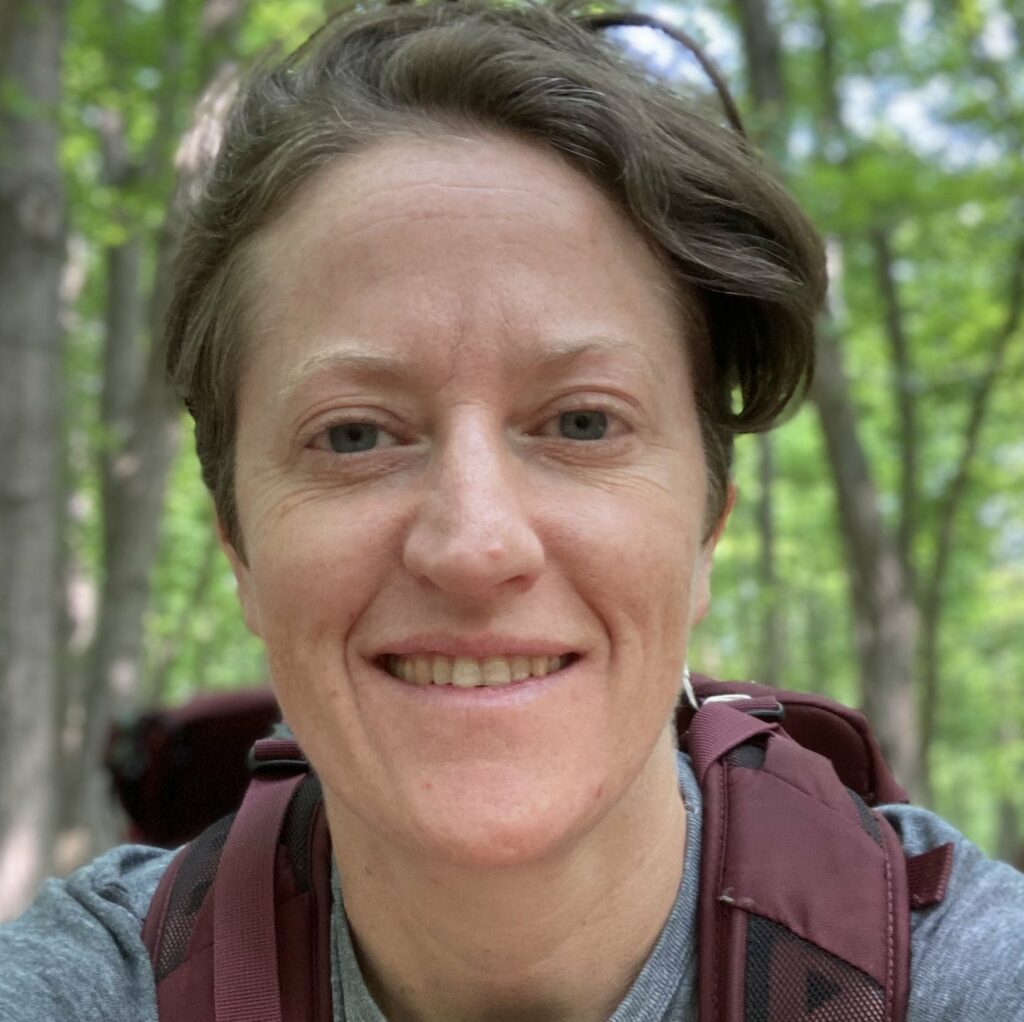
Danielle Ariano
Author of The Requirement of Grief
Danielle Ariano was born and raised in the Philadelphia suburbs, but became a Baltimorean when she moved to the city for college. She was charmed by Baltimore’s quirky, artsy vibe.
Ariano’s forthcoming memoir, The Requirement of Grief, is a meditation on the complexities of the sister bond and the grief that comes when that bond is broken by a sibling’s suicide.
Ariano received her MFA in Creative Nonfiction from the University of Baltimore. As part of her thesis, she wrote, designed and published her first book, Getting Over the Rainbow, a memoir recounting her humorous and sometimes painful experiences coming out as a lesbian.
Ariano’s work has been published in Salon, Huff Post, Baltimore City Paper, Baltimore Fishbowl, North Dakota Quarterly, Cobalt Review, and Welter. She is a former columnist for Baltimore Gay Life, and she has been featured on WYPR’s radio show, The Signal.
When she is not writing, Ariano works as a cabinetmaker. She has great reverence for the hallowed, dusty smell of a woodshop. She finds it thrilling to see a thing take shape from scratch. She loves trees and all the beautiful patterns that can result in woodgrain from stress, insect damage, or even the loss of a limb. She believes that people are very similar to trees in this respect. She lives in Lutherville, Maryland with her wife, son, and dog.
“I have failed to die thirteen times,” my older sister Alexis Ariano wrote in one of her last journals. Her suicide attempts spanned nearly three decades and had come to be something of an expected crisis in my family. What was not expected was that she’d succeed, but in May of 2016, she did.
I learned of her death via a phone call from my father. He and my mother found Alexis’ body after returning home from a trip they’d taken to celebrate 46 years of marriage. Within the hour, I was in my car with my wife, Lindsay Nicoll driving from Maryland, to my parents’ home in Pennsylvania, where Alexis had been living for the previous two years due to her chronic and ever more debilitating mental illnesses. The next few days were busy with numerous appointments: meetings with an arrogant priest, a compassionate undertaker, and an elfish man with a magnificent comb over who sold cemetery plots for a living. By Friday, four days after my parents had found Alexis’ body, her cremains were buried.
What came next was my reckoning with grief as I wrestled with how to grieve the loss of a sister who had long ago become a stranger to me; a sister with whom I had a relationship that was sometimes ghastly and damaging and other times beautiful and sustaining.
Long lost memories of Alexis flooded my brain after her death, and for the first time many years, I yearned for the sister I once knew, while still trying to remember the sister that she had become—terrified that if I forgot the bad parts of her, I would never forgive myself for all the ways I failed to love her. Alongside my own grief, I had a worrisome front row seat to my parents’ anguish, which seemed every day to be carrying them on separate tracks to distant, remote locations: a father ready to purge his daughter’s belongings and a mother desperate to hold on to everything and unable to accept the reality of Alexis’ suicide.
Just as I was getting my footing under the weight of my grief, my world was changed once again five months later when Lindsay got pregnant with our first child. A flood of joyous emotions to swept over me, but they did nothing to alleviate my grief. Indeed, even when I held my son in my arms for the very first time, I was stunned to realize that, even then, the grief did not leave my body. As years passed and my life began, in the recalcitrant way that life always does, to continue on—tentatively and guiltily at first and then willingly, I was forced to understand that my body not only could contain both of these overpowering emotions at once, but indeed it must.
My father meets us at the door. Seeing his pained expression cuts through the hazy, dreamlike aura I’ve been enveloped in since getting the call. It’s as if a magician has pulled a blanket off of an enormous ball of sorrow inside of me and set it rolling down a steep hill. It gathers momentum and then there is no stopping it. When my father and I hug, we begin to weep violently, our bodies shaking. We hold each other in a fierce embrace until it feels as if the sorrow has reached the bottom and the frenzied energy comes to a gradual stop.
My father turns to Lindsay. “Thank you for coming,” he says as he leans in and hugs her.
“I’m so sorry,” she says into his shoulder.
When they separate, I study him. Aside from his red eyes, he doesn’t look different. If I met him on the street, I’d never guess that he’d just lost his daughter. His dark, earth-colored shirt is tucked into his pants. He wears Nikes. Nikes. I’m not sure what I’d expected, but not sneakers. Not the kind of shoe that you wear to exercise.
“What did the note say?” I ask. I’ve decided that there’s no sense in putting it off.
“It just said that she loved us and to tell you she loved you.”
I squint, trying to decide whether or not I believe my father. Would he lie to me if it said something horrible? Would he lie to protect me?
“I want to see it.”
“The police took it.”
“The Requirement of Grief left me floored—and I will be forever transformed. Pain is universal, and Ariano’s prose perfectly articulates the rollercoaster of emotions we confront in the grieving process, showing us that we are not alone. I highly recommend that you not only read this book but use it as a tool to give yourself grace and to understand that healing takes time.”
-D Watkins, New York Times Bestselling Author of The Cook Up and Black Boy Smile
“In The Requirement of Grief, Ariano employs exquisite language to create a beautifully rendered account of her beloved sister’s suicide and her own hard-won healing. Encompassing all facets of survivorship, The Requirement of Grief explores a tragedy that touches many yet is rarely looked at with such clarity and honesty. Ariano’s deft use of language and fast-paced structure create a story that will leave family members with hope.”
-Susan Kushner Resnick, author of Goodbye Wife & Daughters and You Saved Me, Too
Our Authors
Previously Spotlighted
What We Do
For Our Authors
- Work to get author’s books for sale in local bookstores and stocked in DC Public Libraries
- Spotlight the reader at our Reading Event and on our Podcast
- Promote across all our social media and newsletter, including Instagram takeovers
- Pay for targeted ads to promote virtual book sales
- Authors write a guest post for the Washington Independent Review of Books
- Authors give craft talks at The Writer’s Center or DC Writer’s Salon
- Authors are featured in panel events at local bookstores
- Postcards that feature each author and their book with QR codes that direct consumers to buy the book and learn more are distributed to the broader community by our restaurant and small business partners
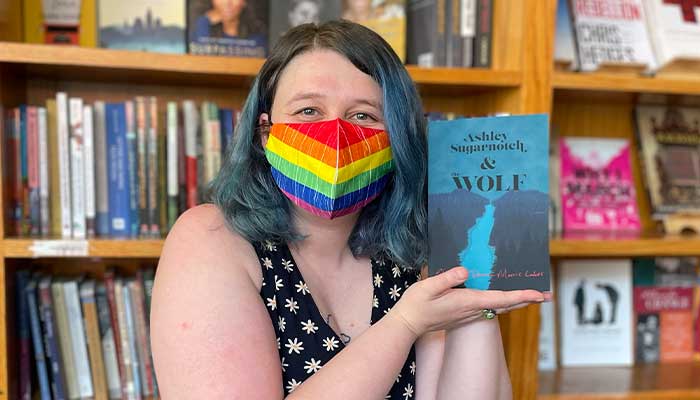
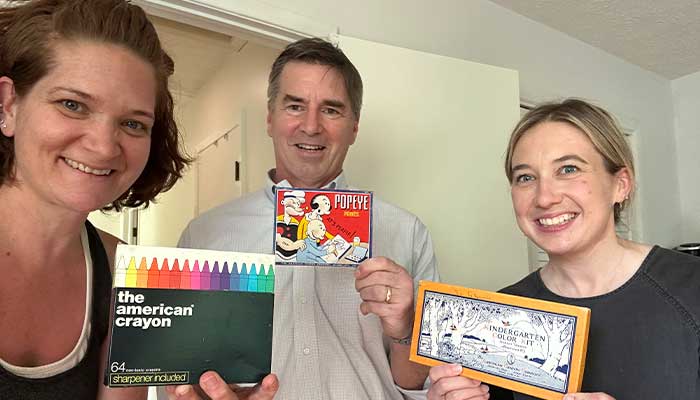
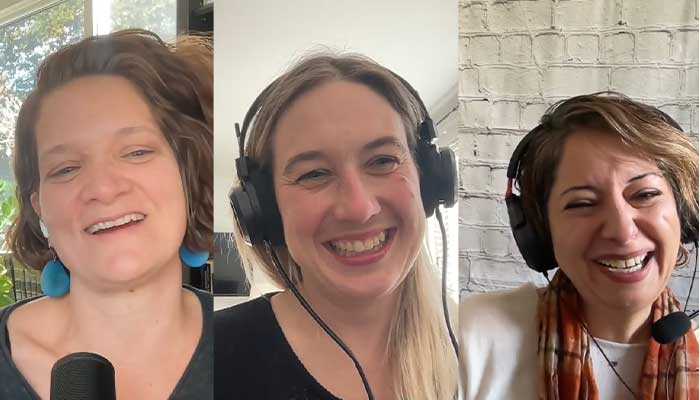
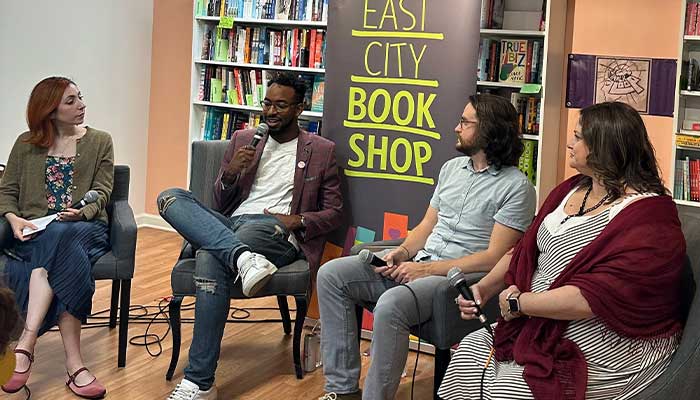
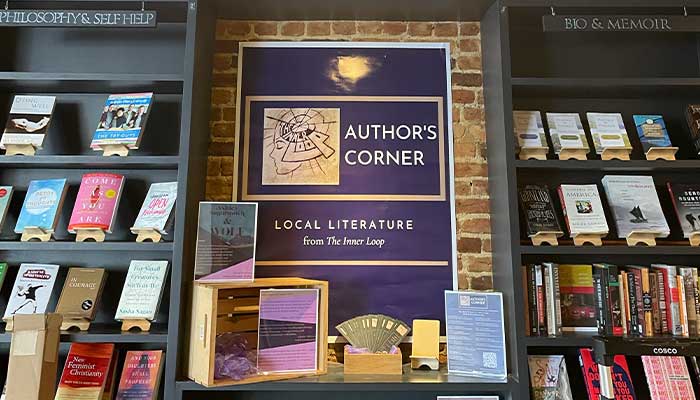
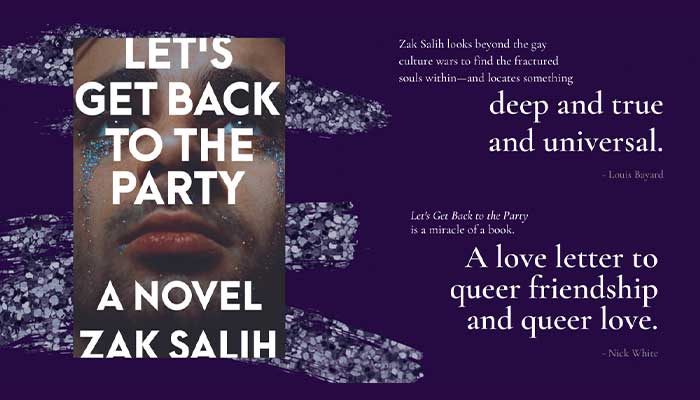
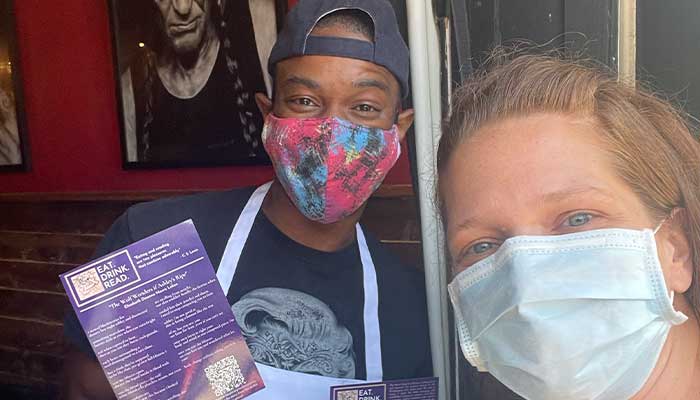
“Being in the Author’s Corner has been one of the most fruitful and satisfying experiences of my career.”
– Cameron MacKenzie
Next Cycle:
Books published between
September 2024 – September 2025

Step Into the Spotlight
Next cohort will be featured
March - November 2025

